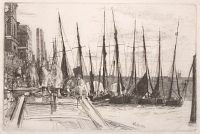Etchings Institutions search term: dunthorne
Billingsgate | ||
| Number: | 51 | |
| Date: | 1859 | |
| Medium: | etching and drypoint | |
| Size: | 152 x 223 mm | |
| Signed: | 'Whistler.' to right of centre | |
| Inscribed: | '1859.' at lower right | |
| Set/Publication: | 'The Portfolio', London, 1878 | |
| No. of States: | 9 | |
| Known impressions: | 125 | |
| Catalogues: | K.47; M.46; T.34; W.45 | |
| Impressions taken from this plate (125) | ||
STATE
Nine states are known before cancellation.
State 1

Signed and dated 'Whistler. 1859.' near the lower edge, just to the right of centre.
The composition is basically complete; there are three arches visible under the bridge in the centre background.
State 2

Fine, closely-spaced horizontal lines are added to the sky above the bridge and the buildings to the right of it; the rightmost arch under the bridge is filled in with horizontal and curved diagonal lines; fine shading further defines the right side of the centre arch and the pier to its right; the clothing of the man standing to left of the tall timber baulks is now shaded; the hulls of the fishing boats and their furled and unfurled sails are more heavily shaded; horizontal lines are added to the distant tower at right.
State 3

Curving and horizontal lines are added between the clock tower and the tall masts in the centre, and one slightly diagonal line runs from the tall masts to the two shorter ones at their right; horizontal and diagonal lines are added to the shading of the sky, from the tall masts to the right side of the image; two oblique right to left diagonal lines (//) or scratches appear above the wooden pier at the far right.
State 4

Drypoint shading in all directions is added to the sky; foul biting appears on the upper portion of the image; the five largest figures on the dock and stern of the barge are partly scraped out; the stays on the tall mast at left are now shown as two lines instead of one; the tall timber baulks at left and most of the furled sails are more heavily shaded.
State 5

Much of the foul biting among the masts is removed, along with some of the lines on the sky, some shading on the tall timber baulks, the tops of the leftmost masts and parts of the stays of the tall mast at left, and that mast itself; the head and torso of the shorter figure, between two taller men on the stern of the barge, is removed.
State 6

Touches of drypoint shading are added to the faces and coats of the standing figure facing left and the figure seated on the stern at right.
State 7

More shading is added to the figure standing to left of the tall baulks and to the two standing and one seated figure on the stern of the barge; facial features are clearly delineated on the shorter figure on the barge, the figure standing to his right and the figure seated on the stern at right; diagonal lines in both directions are added among and to the right of the rightmost masts; a slight (1 mm or less) bevel is added to the edge of the plate, which prints as a very narrow unetched border around the image, within the platemark, and is most notable along the left side.
State 8

Right to left (///) diagonal lines are added below the elbow of the rightmost seated man on the stern of the barge; the plate corners are distinctly rounded.
The earliest impressions of this state have a tiny horizontal scratch among the dots of foul biting at lower left of the pennant on the leftmost tall mast. The tiny horizontal scratch is not visible in later impressions of the state.
Published in The Portfolio in 1878 in this state.
State 9

The bevel around the edge of the plate is increased and is now approximately 1 mm at the top and 1.5 mm at the bottom and sides, slightly increasing the width of the unetched border around the image, within the platemark, and very slightly reducing the etched details along the left and right sides of the image.
Published in this state in P.G. Hamerton, Etching and Etchers, 1880, and by S.G.W. Benjamin, A Group of Etchers, 1882.
Kennedy differentiated the final two states of Billingsgate (his 7th and 8th) by the wear of the lines between the masts. 9 However, the lines are faint in both final states, so the main distinguishing characteristic is the width of the bevel.
9: Kennedy 1910 (cat. no. 47, states 7 and 8).
The latest impressions taken from the plate have a distinct dot in the sky--to the right of the clock tower--above the lines indicating clouds, and this spot is also visible on the cancelled copper plate. These impressions also show small patches of foul biting along the bevel at the top edge of the image, as in the impression reproduced below:


State 9 (cancelled)
The plate was cancelled with one horizontal and two crossed diagonal lines.
Not reproduced.
